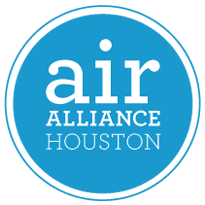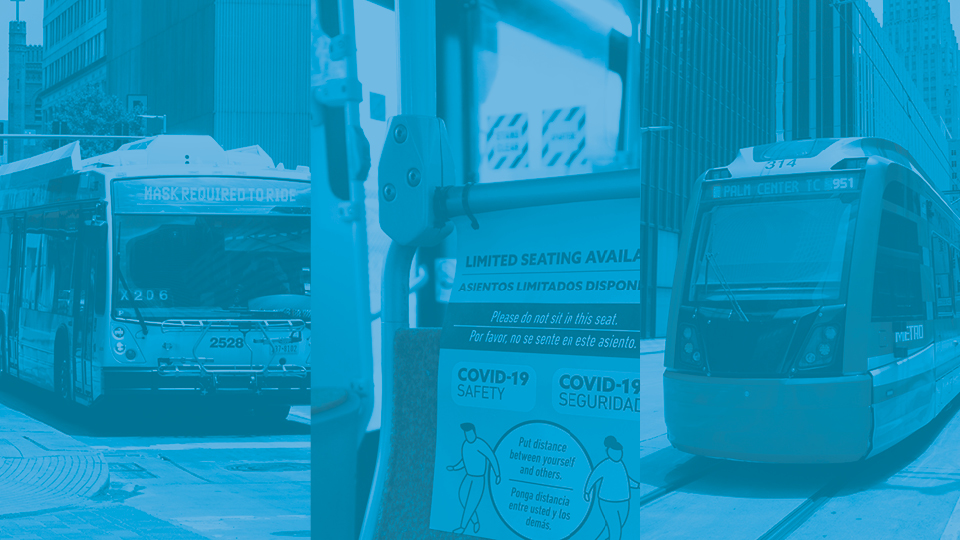New report shows COVID-19 further highlighted importance of reliable public transit, stresses the urgency of investments in this crucial infrastructure
Some of Houston’s most vulnerable communities relied on public transportation as a lifeline, even in the worst conditions.ACCESS THE REPORT HEREWATCH THE RECORDED WEBINAR HERE
FOR IMMEDIATE RELEASE
Media contact: Riikka Pohjankoski, Air Alliance Houston, 713.589.7079 or [email protected]
Houston, TX – The effects of the COVID-19 pandemic highlight the continued demand for more reliable public transportation and the need for increased support for transit agencies from all levels of government, says a new report by Air Alliance Houston in collaboration with LINK Houston and the Robert D. Bullard Center for Environmental and Climate Justice at Texas Southern University.
The report, “COVID and Public Transit in the Houston Region,” looks at the pandemic’s impact on Houstonians’ relationship with public transportation. It comes as Congress considers making once-in-a-generation investments in both human and hard infrastructure, like transportation. The report shows that while COVID-19 caused a steep drop in transit usage rates throughout the region, some of the most vulnerable community members, particularly ‘essential workers,’ relied on transit to continue working for the larger community and to fulfill their own basic needs even in the worst conditions of the pandemic.
“It is well-established that reliable, accessible public transit is key in achieving a number of desirable goals, from providing access to opportunities, to reducing traffic congestion and combating climate change,” said Harrison Humphreys, Transportation Program Manager at Air Alliance Houston and lead author of the study. “Our findings about transit use during the pandemic further highlight the importance of reliable transit as a public good – as is already agreed upon by city planners and environmental activists alike.”
For the report, three representative Houston communities – Fifth Ward, Third Ward, and Gulfton/Sharpstown – were examined. These areas have a higher proportion of low-income residents and are predominantly communities of color. These factors indicate a greater chance that a resident works at a service job which is considered ‘essential.’ Additionally, low-income and communities of color were hit particularly hard by the pandemic.
Through quantitative and qualitative analysis our team found that these communities continued to rely on transit throughout the lockdown in 2020. Throughout the pandemic, residents felt they had to set aside their personal health and safety when making transportation decisions. Through community roundtable discussions, residents expressed a strong desire to see more and better transit in Houston that works for them.
“We must consider transportation policy as a universal matter deserving of innovation, equity and accountability,” said Nikki Hawkins-Knight, a Community Research Team Member. “We cannot continue to build cities and hope to positively impact the health of our economy and communities without frequently assessing the impacts, deficiencies and user needs. The transit ecosystem must integrate safety, sanitation, connectivity and overall reliability for it to be a true asset.”
Many of the region’s stakeholders and policymakers echoed the communities’ sentiments with their personal and professional perspectives on how the pandemic impacted the Houston area’s transportation. Regional leaders interviewed for the report, such as City Council Member David Robinson and Houston METRO CEO Tom Lambert, offer their assessments of the challenges and how the region can look to the future, hammering home the conclusion that there is a need to better support multimodal infrastructure.
“Public transit is an indispensable public service,” said Humphreys. “Yet, at the local, state, and federal level, we chronically underfund it.”
“As the Houston region continues to build toward ‘a new normal,’ we strongly urge policymakers to prioritize operational and capital project funding for public transportation,” said Ashley Johnson, Director of Community Affairs at LINK Houston and study co-author. “Furthermore, METRO must continue to restore service and equitably implement its METRONext Moving Forward Plan as the COVID-19 pandemic demonstrates the vital role public transit plays in the economic vitality of our region.”
The key policy recommendations from the report are:
- Federal and state policymakers must increase funding to public transit.
- Regional and state transportation planners must make public transit the focal point of long-term planning and change how the successfulness of transit is evaluated. Transit should not be expected to make a profit; the goods it provides, particularly to the most vulnerable, are invaluable.
- Houston Metropolitan Transit Authority (METRO) should continue listening to residents on how to return service back to normal.
###
Air Alliance Houston is a non-profit advocacy organization working to reduce the public health impacts from air pollution and advance environmental justice through applied research, education, and advocacy. For more information and resources, please visit www.airalliancehouston.org.
LINK Houston advocates for a robust and equitable transportation network so that all people can reach opportunity. For more information, please visit www.linkhouston.org.
The Robert D. Bullard Center for Environmental and Climate Justice seeks to lead and support efforts whose aim is to end systemic racism and structural inequality where Black people live, work, play, learn, and pray, and advance environmental and climate justice, sustainability and community resilience–viewed through a racial justice and equity lens. For more information, please visit http://tsu.edu/academics/colleges-and-schools/bjml-school-public-affairs/departments/centers-and-units/bullard-center.

